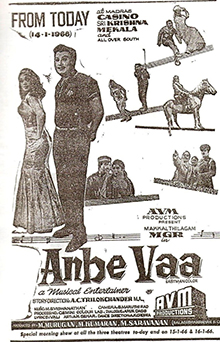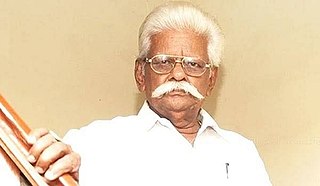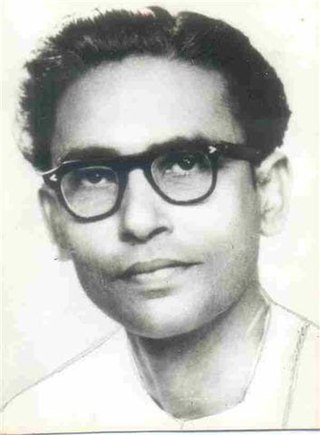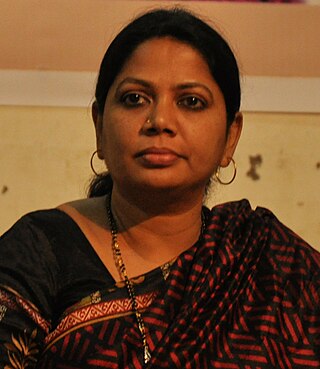Related Research Articles

Tamil literature includes a collection of literary works that have come from a tradition spanning more than two thousand years. The oldest extant works show signs of maturity indicating an even longer period of evolution. Contributors to the Tamil literature are mainly from Tamil people from south India, including the land now comprising Tamil Nadu, Kerala, Eelam Tamils from Sri Lanka, as well as the Tamil diaspora.

Bharathidasan, was a 20th-century Tamil poet and rationalist writer whose literary works handled mostly socio-political issues. He was deeply influenced by the Tamil poet Subramania Bharathi and named himself "Bharathi dasan" meaning follower or adherent of Bharathi. His greatest influence was Periyar and his self-respect movement. Bharathidasan's writings served as a catalyst for the growth of the Self-Respect Movement in Tamil Nadu. In addition to poetry, his views found expression in other forms such as plays, film scripts, short stories and essays. The Government of Puducherry union territory has adopted the song of Invocation to Mother Tamil, written by Bharathidasan as the state song of Puducherry.

Sugathakumari was an Indian poet and activist, who was at the forefront of environmental and feminist movements in Kerala, India.

Anbe Vaa is a 1966 Indian Tamil-language romantic comedy film written and directed by A. C. Tirulokchandar. The film stars M. G. Ramachandran and B. Saroja Devi, with S. A. Ashokan, Nagesh, T. R. Ramachandran, P. D. Sambandam, Manorama and T. P. Muthulakshmi in supporting roles. Based on the 1961 American film Come September, it follows JB, a wealthy industrialist who goes on vacation to his bungalow in Shimla, only to discover that his caretaker and his wife have left for Kasi after renting the bungalow to a family. The rest of the film revolves around JB's response to this situation.

Ilavenil Meena Kandasamy is an Indian poet, fiction writer, translator and activist from Chennai, Tamil Nadu, India.

Rajam Krishnan, was a feminist Tamil writer from Tamil Nadu, India.

K. Srilata is an Indian poet, fiction writer, translator and academic based in Chennai. Her poem, In Santa Cruz, Diagnosed Home Sick won the First Prize in the All India Poetry Competition in 1998. She has also been awarded the Unisun British Council Poetry Award (2007) and the Charles Wallace writing residency at the University of Sterling (2010). Her debut novel Table for Four was long-listed in 2009 for the Man Asian Literary Prize and released in 2011.

Pulavar Pulamaipithan was an Indian scholar, poet and lyricist who got recognition through the song "Naan yaar nee yaar" which was featured in the Tamil film Kudiyirundha Koyil in 1968. He briefly served as the presidium chairman of AIADMK from 2002 to 2003, when he resigned citing ill-health.
Vishnupuram Award is a literary award instituted by Vishnupuram Ilakkiya Vattam, the literary organization created by writer Jeyamohan and his readers. The award was named after the writer's famous novel in Tamil, Vishnupuram. This award was initiated to honour the under-recognized pioneers and senior writers in Tamil literature. This contains cash award of Rs 1,00,000 and a memento, a book on the author will be published and a documentary on the awardee release during the occasion.
S. Revathi is an Indian lyricist, poet, activist and doctor. She has published three books of poetry and is the editor of Panikkudam, a literary quarterly for women's writing and also the first Tamil feminist magazine. Post several literary meetings and reviewing poetry collections by fellow students, she began working on some of her own pieces.
Piraisoodan was a Tamil poet and lyricist.
Vishnupuram Ilakkiya Vattam is a literary organization created by Tamil writer Jeyamohan and his readers and fans. It is named after his noted work Vishnupuram. It is currently based out of Coimbatore in Tamil Nadu, India and is being coordinated by K.V.Arangasamy. It awards the Vishnupuram Award every year.
Yu Hsi is a Taiwanese Tamil poet and scholar who has translated the Tirukkural and the poems of Subramaniya Bharathi and poet Bharathidasan in Mandarin. He is the founder and president of the Tamil Sangam in Taiwan. He has received various awards, including awards from Seoul World Academy of Arts and Culture (2004), Thiruvalluvar Award (2014), and a felicitation from former President of India A. P. J. Abdul Kalam.
M. L. Thangappa was a Tamil writer and translator. He wrote many poems, articles and translations.
Saminathan Dharmambal (1890–1959) was an Indian social activist and women's rights activist. She is remembered for her contributions to the Tamil language and involvement in the Anti-Hindi agitation of 1937–40. In 1951, she was given the title of vira Tamil annai.
Akkārakkani Nacchumanār was a poet of the Sangam period to whom verse 46 of the Tiruvalluva Maalai is ascribed.

Vanidasan was a 20th-century Tamil poet. He was known to be one from Pavalar generation known as 'Bharathidasan's poetic ancestry'. He was an expert in Tamil, Telugu, English and French. He published over 17 collections of poetry, including several novels in poetry form.

Rakkiaiah is an Indian Tamil writer, activist, and politician known by the pen name Salma and the nickname Rajathi, and often referred to as Rajathi Salma. Her works have received international acclaim and she is renowned as a sensation in contemporary Tamil literature.
Sukirtharani is an Indian feminist poet who is widely acclaimed for her contribution to contemporary Dalit and Tamil literature.

Palani Bharathi or Pazhani Bharathi is an Indian writer and lyricist who works in Tamil cinema.
References
- 1 2 3 4 "Malathi Maitri". Poetry International Web . 1 November 2008.
- ↑ "Malathi Maithri". Sangam House. Retrieved 18 November 2020.
- 1 2 Palinivalan (25 January 2018). "டெல்லியில் நிறவெறி தாண்டவமாடுகிறது: கவிஞர் மாலதி மைத்ரி பேட்டி". Hindu Tamil Thisai (in Tamil). Retrieved 18 November 2020.
- 1 2 Muralidharan, Kavitha (31 August 2013). "Forward, in the past". The Hindu. ISSN 0971-751X . Retrieved 18 November 2020.
- ↑ "An Introduction to 'Wild Words: Four Tamil Poets'". Harper Broadcast. HarperCollins. 7 July 2015. Retrieved 18 November 2020.
- ↑ Mohanakrishnan, Ramani (24 December 2017). ""கேள்விகளுக்கு விடை தந்தவர் பெரியார்" #RememberingPeriyar". Vikatan (in Tamil). Retrieved 18 November 2020.
- ↑ "'ஆண்மை என்ற வார்த்தையை அழித்தெறியுங்கள்!' - சீறும் கவிஞர் மாலதி மைத்ரி". Vikatan (in Tamil). 22 February 2017. Retrieved 18 November 2020.